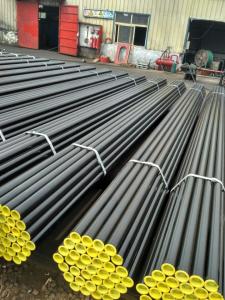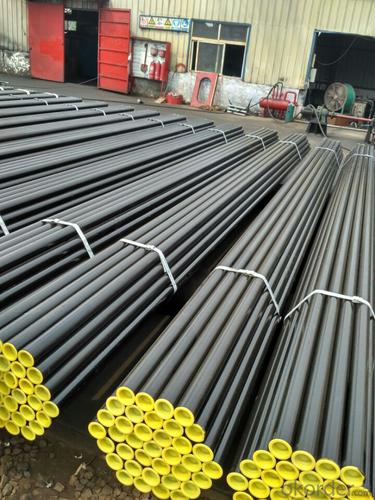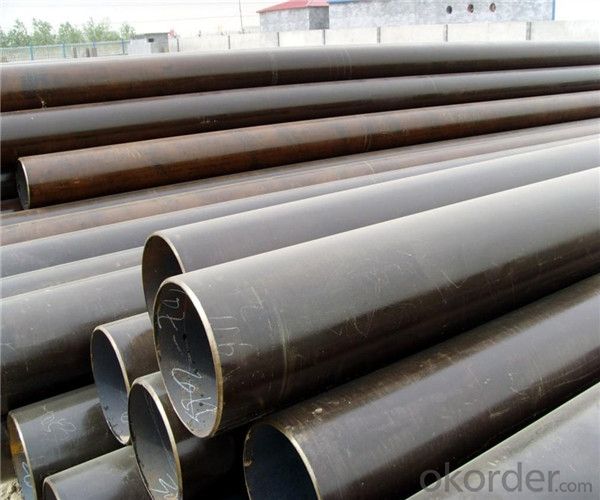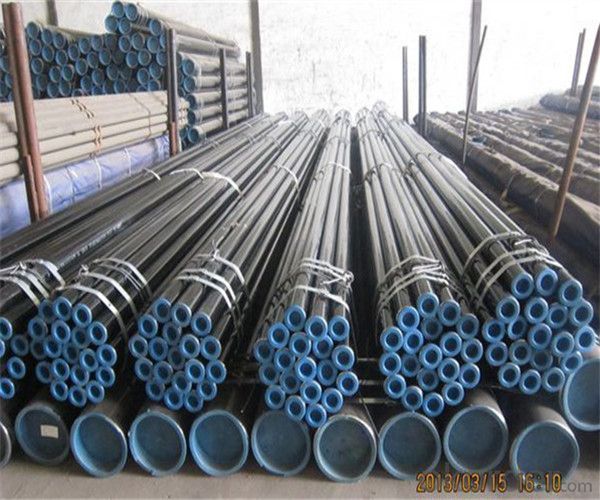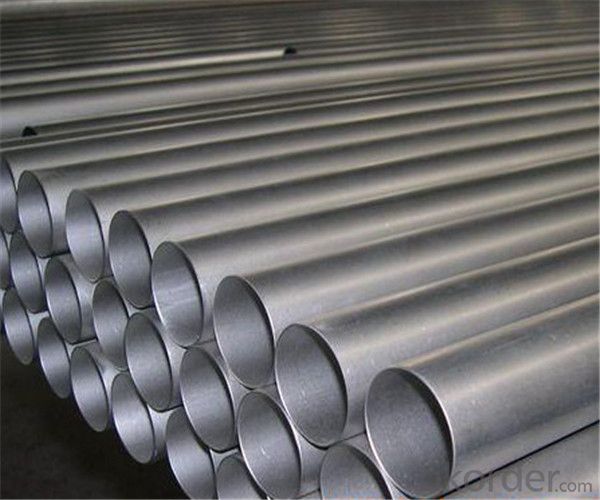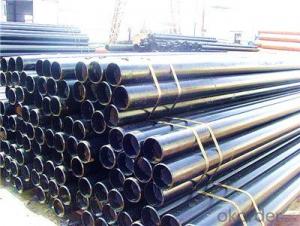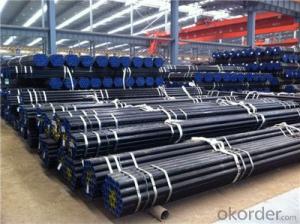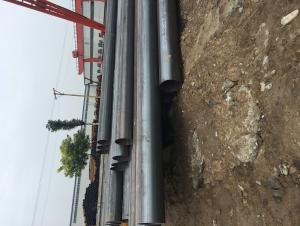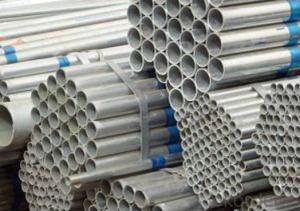New prime best price seamless steel pipe
- Loading Port:
- Tianjin
- Payment Terms:
- TT or LC
- Min Order Qty:
- 100 m.t.
- Supply Capability:
- 3000000 m.t./month
OKorder Service Pledge
OKorder Financial Service
You Might Also Like
1、Structure of Seamless Pipe ASTM A106/53:
Seamless pipe is formed by drawing a solid billet over a piercing rod to create the hollow shell. As the manufacturing process does not include any welding, seamless pipes are perceived to be stronger and more reliable. Historically seamless pipe was regarded as withstanding pressure better than other types, and was often more easily available than welded pipe.
2、Main Features of the Seamless Pipe ASTM A106/53:
• High manufacturing accuracy
• High strength
• Small inertia resistance
• Strong heat dissipation ability
3、Seamless Pipe ASTM A106/53Specification:
Standard | GB, DIN, ASTM ASTM A106-2006, ASTM A53-2007 |
Grade | 10#-45#, 16Mn 10#, 20#, 45#, 16Mn |
Thickness | 8 - 33 mm |
Section Shape | Round |
Outer Diameter | 133 - 219 mm |
Place of Origin | Shandong, China (Mainland) |
Secondary Or Not | Non-secondary |
Application | Hydraulic Pipe |
Technique | Cold Drawn |
Certification | API |
Surface Treatment | factory state or painted black |
Special Pipe | API Pipe |
Alloy Or Not | Non-alloy |
Length | 5-12M |
Outer Diameter | 21.3-610mm |
Grade | 20#, 45#, Q345, API J55, API K55, API L80, API N80, API P110, A53B |
Standard | ASME, ASTM |
1) Material:20#(ASTM A 106/A53 GRB.API5LGRB,GB),45#,16Mn,10#.
2) Specification range:OD:21.3-610mm,WT:6-70mm,length:6-12m or according to the requirement of clients.
3) Excutive standards:GB,ASME API5L.ASTM A 106/A53,Despite of the above standards,we can also supply seamless steel pipe with standard of DIN,JIS,and so on,and also develop new products according to the requirements of our clients!
4、Packaging & Delivery
Packaging Details: | seaworthy package,bundles wrapped with strong steel strip |
Delivery Detail: | 15-30days after received 30%TT |
5、FAQ of Seamless Pipe ASTM A106/53:
①How is the quality of your products?
Our products are manufactured strictly according to national and internaional standard, and we take a test
on every pipe before delivered out. If you want see our quality certifications and all kinds of testing report, please just ask us for it.
Guaranteed: If products’ quality don’t accord to discription as we give or the promise before you place order, we promise 100% refund.
②How about price?
Yes, we are factory and be able to give you lowest price below market one, and we have a policy that “ for saving time and absolutely honest business attitude, we quote as lowest as possible for any customer, and discount can be given according to quantity”,if you like bargain and factory price is not low enough as you think, just don’t waste your time.Please trust the quotation we would give you, it is professional one.
5.Product pictures
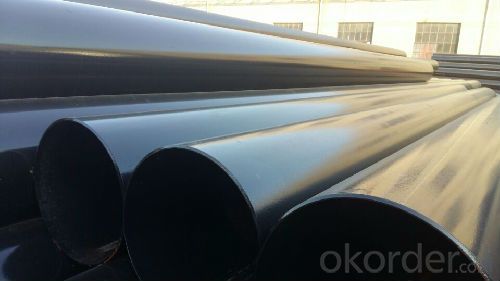
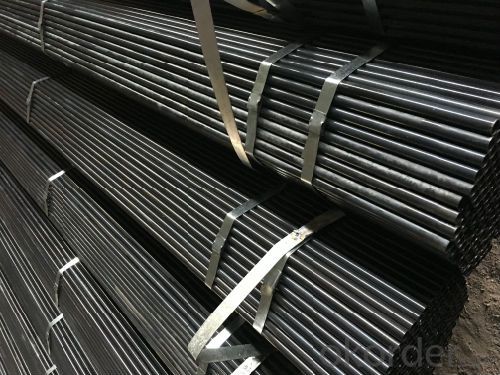
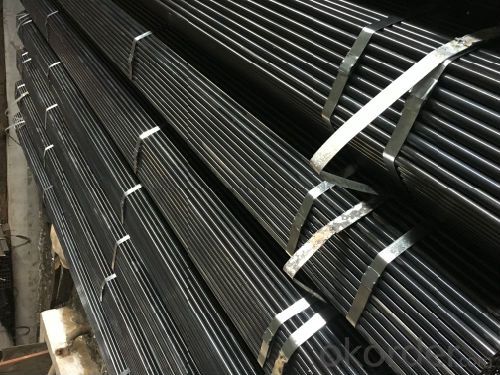
- Q: How are steel pipes used in the fabrication of storage tanks?
- Steel pipes are commonly used in the fabrication of storage tanks due to their strength, durability, and corrosion resistance. They are utilized in various ways, such as forming the structural framework of the tank, creating the walls and roof, and connecting different components together. Additionally, steel pipes can be welded or bolted to ensure a secure and leak-proof construction, making them an ideal choice for storage tank fabrication.
- Q: How do steel pipes handle thermal expansion and contraction?
- Steel pipes are able to handle thermal expansion and contraction due to their unique properties and design. When exposed to high temperatures, steel pipes expand as the molecules within the material gain energy and move more vigorously. Conversely, when exposed to low temperatures, steel pipes contract as the molecules lose energy and move less vigorously. To accommodate these changes, steel pipes are manufactured with certain features. One such feature is the allowance of clearance between pipe joints. This clearance allows for expansion and contraction without causing stress or deformation in the pipe. Additionally, the use of expansion joints or flexible connectors within the piping system helps to absorb the thermal movements and prevent damage. Furthermore, steel pipes are often installed with proper anchoring and support systems. These systems are designed to allow the pipes to freely expand and contract within a certain range without causing excessive stress or strain on the structure or surrounding components. Anchoring and support systems also help to maintain the overall stability and integrity of the piping system. In some cases, thermal insulation materials are applied to steel pipes to minimize temperature changes and reduce the effects of expansion and contraction. These insulating materials help to maintain a more consistent temperature within the pipe, reducing the magnitude of thermal movements. Overall, steel pipes are well-suited to handle thermal expansion and contraction due to their inherent strength and flexibility. With proper design, installation, and maintenance, steel pipes can effectively accommodate temperature changes without compromising their structural integrity or functionality.
- Q: How long are the seamless tubes? Are they six meters long?
- The usual length of steel pipe is as follows: hot rolled steel pipe 3000~12000mm and cold drawn steel pipe 3000~10500mm.
- Q: What are the different types of steel pipe connections for steam pipelines?
- There are several types of steel pipe connections commonly used for steam pipelines. These include threaded connections, flanged connections, welded connections, and grooved connections. Each type has its own advantages and is chosen based on factors such as the pipe size, pressure, and temperature requirements, as well as the ease of installation and maintenance.
- Q: What does cathodic protection of steel tubes mean?
- There are two ways of cathodic protection: sacrificial anode, cathodic protection and impressed current cathodic protection.Sacrificial anode: connect a living metal or alloy to a protective metal to form a galvanic cell. The active metal replaces the protected metal to lose electrons so that the protected metal is not corroded.
- Q: Can steel pipes be used for natural gas processing plants?
- Yes, steel pipes can be used for natural gas processing plants. Steel pipes have excellent strength and durability, making them suitable for transporting and processing natural gas. They can withstand high-pressure conditions and are resistant to corrosion, providing a safe and reliable option for gas processing facilities.
- Q: How are steel pipes used in the manufacturing of boilers?
- Steel pipes are used in the manufacturing of boilers as they provide high strength, durability, and resistance to extreme temperatures and pressure. These pipes are used for transporting hot gases and liquids within the boiler system, ensuring efficient heat transfer and preventing any leaks or failures.
- Q: What are the uses of seamless steel tubes?
- A large number of pipes used for conveying fluids, such as pipelines for transporting petroleum, natural gas, gas, water, and certain solid materials.
- Q: What are the different grades of steel used in pipes?
- The different grades of steel used in pipes include carbon steel, alloy steel, stainless steel, and duplex stainless steel.
- Q: 45 and 316 which steel tubes are of high hardness?
- 316 stainless steel by adding Mo element, the corrosion resistance, and high temperature strength has greatly improved, high temperature can reach 1200-1300 degrees, can be used in severe conditions. 316F stainless steel is easy to cut stainless steel with high sulfur content. Good corrosion resistance, easy processing, good smoothness, suitable for axial parts.
Send your message to us
New prime best price seamless steel pipe
- Loading Port:
- Tianjin
- Payment Terms:
- TT or LC
- Min Order Qty:
- 100 m.t.
- Supply Capability:
- 3000000 m.t./month
OKorder Service Pledge
OKorder Financial Service
Similar products
Hot products
Hot Searches
Related keywords
